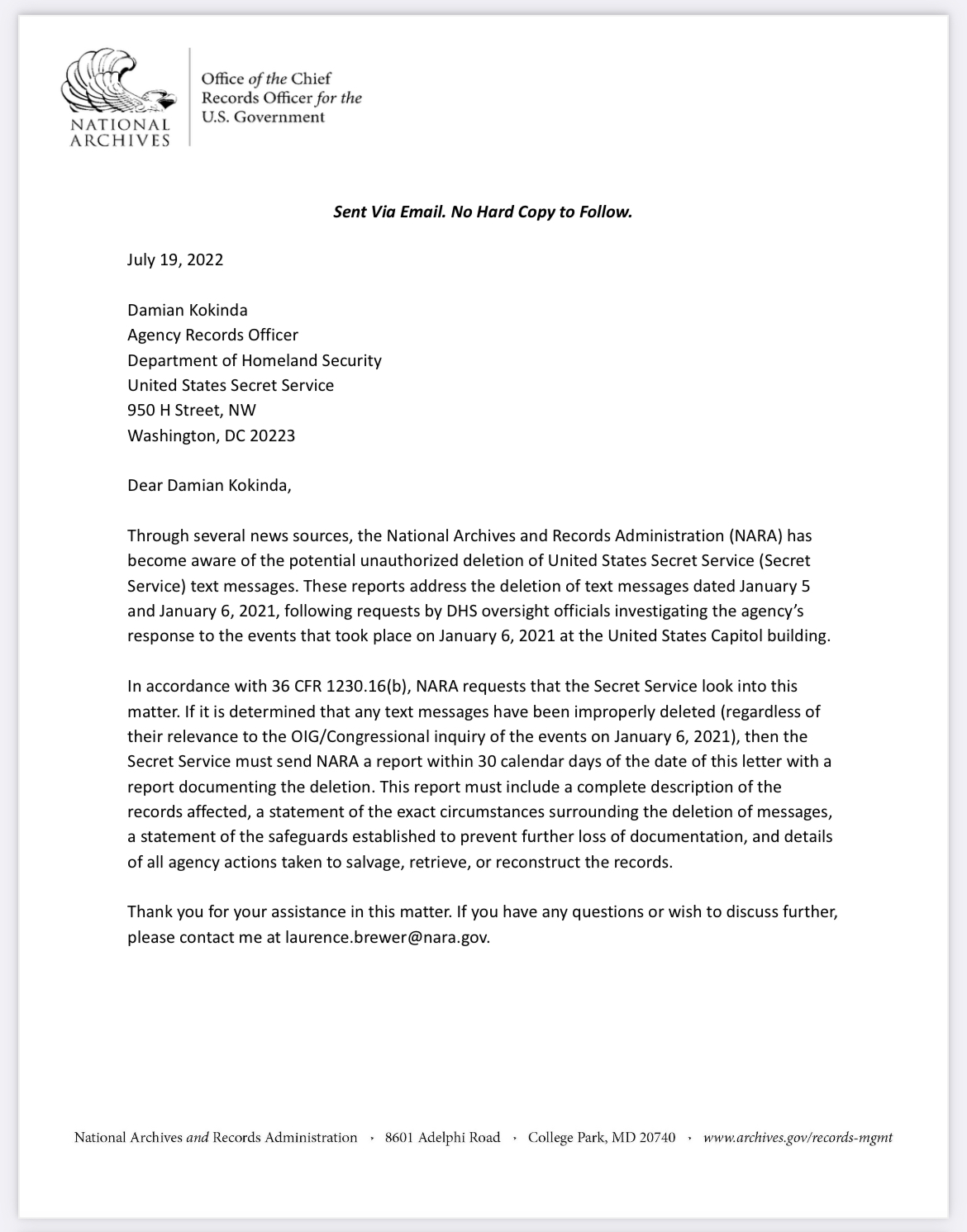
The National Archives and Records Administration has issued a written inquiry to the Department of Homeland Security, United States Secret Service, relating to the reported “unauthorized deletion” of Secret Service text messages:
“Through several news sources, the National Archives and Records Administration (NARA) has become aware of the potential unauthorized deletion of United States Secret Service (Secret Service) text messages.
“These reports address the deletion of text messages dated January 5 and January 6, 2021, following requests by DHS oversight officials investigating the agency’s response to the events that took place on January 6, 2021 at the United States Capitol building.
“In accordance with 36 CFR 1230.16(b), NARA requests that the Secret Service look into this matter. If it is determined that any text messages have been improperly deleted (regardless of their relevance to the OIG/Congressional inquiry of the events on January 6, 2021), then the Secret Service must send NARA a report within 30 calendar days of the date of this letter with a report documenting the deletion. This report must include a complete description of the records affected, a statement of the exact circumstances surrounding the deletion of messages, a statement of the safeguards established to prevent further loss of documentation, and details of all agency actions taken to salvage, retrieve, or reconstruct the records.”
https://www.archives.gov/files/records-mgmt/resources/ud-2022-0054-dhs-…
Improper public records destruction in Kentucky is treated the same way.
KRS 171.720 requires the head of each state and local agency to “notify the department [of Libraries and Archives] of any actual, impending or threatened unlawful removal, defacing, alteration or destruction of records in the custody of the agency that shall come to his attention.”
https://apps.legislature.ky.gov/law/statutes/statute.aspx?id=4850
https://kdla.ky.gov/records/Documents/Destruction%20Guidelines_November…
The statute contemplates recovery efforts — including physical recovery of hard copy files removed by a departing official or his staff and “forensic” recovery of digital records — with the assistance of the department shall initiate action through the Attorney General for recovery of such records as shall have been unlawfully removed and for such other redress as may be provided by law.”
Under KRS 171.990(3), any
person knowingly violating KRS 171.720 — and other statutes relating to records management, retention, and destruction — is guilty of a Class A misdemeanor, liable for damages or losses incurred by the Commonwealth, and subject to dismissal from state employment “upon a determination of fact, at a hearing, that a serious violation did occur.”
https://apps.legislature.ky.gov/law/statutes/statute.aspx?id=4878
Recovery efforts were undertaken by KDLA not long after Governor Wallace Wilkinson left office, taking with him the archival record of his administration. Similar efforts were made by the Finance and Administration Cabinet early in the Beshear administration to recover pardon records removed by departing members of the Bevin administration — including one whose name has recently been much in the news.
In the 2022 legislative session, lawmakers “created a new section of KRS Chapter 65 to allow local governments to submit to the state or the Legislative Research Commission an affidavit in lieu of a record that has been lost, damaged, or destroyed that was required to be submitted; establish requirements for the affidavit, and allow a government entity to require the production of the information contained in the record if necessary for governmental operations.” The new law expressly excludes those circumstances “set out in KRS 519.060 when a person tampers with a record with the intent of invoking” the new law and submitting an affidavit to LRC in lieu of public records.
https://apps.legislature.ky.gov/record/22rs/HB351.html
The new law was believed — but never confirmed — to be a reaction to the destruction of records resulting from the tornado outbreak of December 2021 in western Kentucky. Lawmakers made no public effort to reconcile the new law with existing laws requiring records destruction reporting to KDLA.
Clearly, however, a public agency’s failure to comply with KRS 171.720, requiring notification to KDLA of unlawful removal or destruction of public records — followed by meaningful recovery efforts — to KDLA raises grave concerns in an open records dispute involving agency denial of the existence of records that are statutorily mandated.



